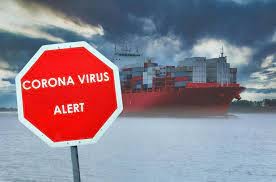The COVID-19 pandemic and the conflict in the Red Sea region have both had significant impacts on global shipping, albeit in different ways. Below, we compare and contrast the effects of these two phenomena on maritime transportation:
Disruption of Supply Chains: – COVID-19 Pandemic: The pandemic caused widespread disruptions to global supply chains, leading to port closures, labor shortages, and logistical challenges. Lockdown measures and restrictions on movement hampered the movement of goods and created bottlenecks in maritime transportation.- Red Sea Conflict: The conflict in the Red Sea region, including piracy and geopolitical tensions, has also disrupted supply chains by impeding the free flow of goods through key maritime routes. Shipping companies have had to navigate through heightened security risks and implement additional security measures to protect vessels and crew.
Impact on Trade Volumes: – COVID-19 Pandemic: The pandemic resulted in fluctuations in trade volumes as demand for certain goods surged while others declined. Lockdown measures and economic uncertainties led to shifts in consumer behavior and trade patterns, affecting the volume and composition of cargo transported by sea.- Red Sea Conflict:The conflict in the Red Sea region has had localized impacts on trade volumes, particularly for countries bordering the region. Heightened security risks and disruptions to maritime routes have affected trade flows in the area, impacting the economies of countries reliant on maritime trade through the Red Sea.
Economic Consequences:- COVID-19 Pandemic: The pandemic triggered a global economic downturn, affecting industries across the board, including maritime transportation. Shipping companies faced financial challenges due to reduced demand, volatile freight rates, and increased operating costs associated with health and safety measures.- Red Sea Conflict: The conflict in the Red Sea region has led to economic uncertainties for countries in the region and beyond. In addition to direct economic losses from disrupted trade, the conflict has deterred investment in maritime infrastructure and deterred foreign companies from operating in the area, affecting long-term economic prospects.
Response and Mitigation Efforts:- COVID-19 Pandemic: Governments, shipping companies, and international organizations have collaborated to mitigate the impact of the pandemic on maritime transportation. Measures such as crew vaccinations, health protocols, and digitalization initiatives have been implemented to enhance resilience and adaptability in the face of future crises.- Red Sea Conflict:Efforts to address the conflict in the Red Sea region have involved diplomatic negotiations, regional cooperation initiatives, and international peacekeeping efforts. Enhanced security measures, such as naval patrols and maritime surveillance, aim to safeguard shipping routes and ensure the safe passage of vessels through the area.
In conclusion, while the COVID-19 pandemic and the conflict in the Red Sea region have presented distinct challenges to maritime transportation, both have underscored the importance of resilience, adaptability, and cooperation in ensuring the smooth flow of goods and maintaining the stability of global supply chains. By addressing the root causes of disruptions and adopting proactive measures, stakeholders can mitigate risks and build a more resilient maritime sector capable of withstanding future challenges, whether they be pandemics, conflicts, or other crises.






